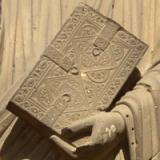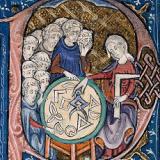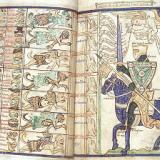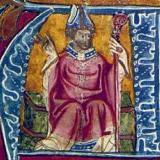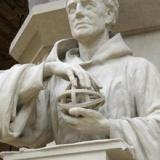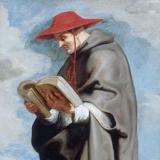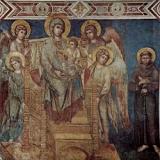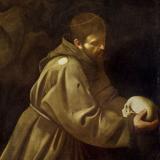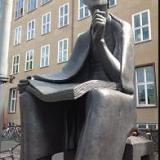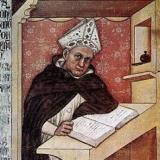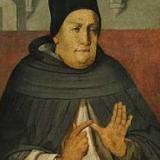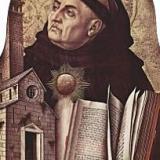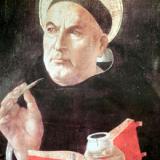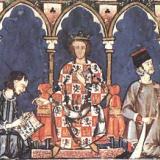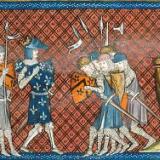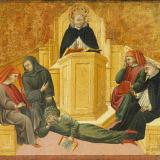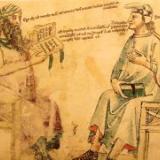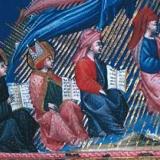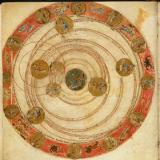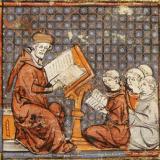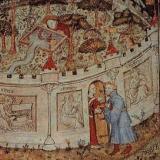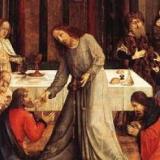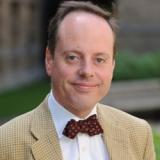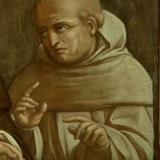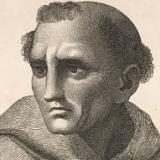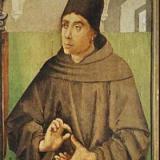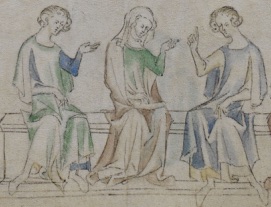Thirteenth Century Philosophy
In the thirteenth century, medieval philosophy reaches the highpoints of scholasticism with such famous names as Bonaventure, Thomas Aquinas, Henry of Ghent, and Duns Scotus. In Paris, debates rage over the newly rediscovered works of Aristotle, with reactions ranging from condemnation to enthusiasm. There are developments in science, notably with the pioneering empiricism of Roger Bacon, while philosophers outside the scholastic mainstream also make contributions (including female thinkers like Mechthild of Magdeburg). In addition to podcasts on specific thinkers, certain themes are covered, such as the transcendentals, magic, poverty, animals, just war theory, philosophy of language, and the eternity of the world. This series of episodes includes interviews with Charles Burnett, Therese Cory, Richard Cross, Catarina Ditulh-Novaes, Martin Pickavé, Georgio Pini, Scott MacDonald, and Juhana Toivanen.
In addition to the general bibliography on medieval philosophy provided here see:
• H. Holzhey (ed.), Grundriss der Geschichte der Philosophie: die Philosophie des Mittelalters, 13. Jahrhundert (Basel: 2017).
• N. Kretzmann, A. Kenny and J. Pinborg (eds), The Cambridge History of Later Medieval Philosophy (Cambridge: 1982).
• J. Marenbon, Later Medieval Philosophy (1150-1350) (London: 1987).
• S.P. Marrone, The Light of thy Countenance: Science and Knowledge of God in the Thirteenth Century, vol.1: a Doctrine of Divine Illumination (Leiden, 2001).
• R. Pasnau, Theories of Cognition in the Later Middle Ages (Cambridge: 1997).
• I.P. Wei, Intellectual Culture in Medieval Paris: Theologians and the University, c. 1100-1330 (Cambridge: 2012).
Posted on
The terminist logicians William of Sherwood and Peter of Spain classify the various ways that language can relate to the world.
Thanks to Catarina Dutilh Novaes for help with this episode.
Posted on
Richard Rufus and anonymous commentators on Aristotle explore the nature of motion, time, infinity and space.
Posted on
John Blund and William of Auvergne draw on Aristotle and Avicenna to argue that the soul is immaterial and immortal.
Posted on
Philip the Chancellor introduces the transcendentals, a key idea in medieval metaphysics and aesthetics.
Posted on
The scholastics explore Aristotle’s ethical teaching and the concept of moral conscience.
Posted on
Translator, scientist and theologian Robert Grosseteste sheds light on the cosmos, human understanding, and the rainbow.
Posted on
Roger Bacon extols the power of science based on experience and uses a general theory of "species" to explain light and vision.
Posted on
Charles Burnett tells Peter about the role of magic in medieval intellectual life.
Posted on
Bonaventure argues that human knowledge depends on an illumination from God.
Posted on
Peter Olivi proposes that awareness occurs not through passively being affected by things, but by actively paying attention to them.
Posted on
Medieval ideas about what animals do and do not have in common with humans, and how we should treat them.
Posted on
Bonaventure and Peter Olivi respond to critics of the Franciscan vow of poverty, in a debate which produced new ideas about economics and rights.
Posted on
Two Beguine authors, Hadewijch and Mechthild of Magdeburg, deploy the tropes of courtly love in vernacular writings about their mystical experiences.
Posted on
Robert Kilwardby is infamous for his ban on teaching certain philosophical ideas at Oxford, yet made contributions in logic and on the soul.
Posted on
Was medieval logic "formal"? Peter finds out from Catarina Dutilh Novaes.
Posted on
Albert the Great earns his nickname “universal doctor” by devoting himself to the whole of nature, from geology and botany to the study of human nature.
Posted on
Albert the Great’s theory of being and his attempt to explain what changes in the human mind when we come to see God in the afterlife.
Posted on
Therese Cory tells Peter what 13th century philosophers thought about self-awareness.
Posted on
An introduction to Thomas Aquinas, his views on faith and reason, and his famous “five ways” of proving God’s existence.
Posted on
Thomas Aquinas makes controversial claims concerning the unity of the soul and the empirical basis of human knowledge.
Posted on
Natural and supernatural virtue and happiness in Thomas Aquinas and his teacher, Albert the Great.
Posted on
Natural law and political legitimacy in thirteenth century thinkers up to and including Thomas Aquinas.
Posted on
Aquinas follows medieval legal thinkers in defining the conditions under which war may be justified, and proposes his famous doctrine of double effect.
Posted on
Scott MacDonald joins Peter to discuss Thomas Aquinas' views on human knowledge.
Posted on
Two rounds of condemnations at Paris declare certain philosophical teachings as heretical. But what were the long term effects?
Posted on
Peter answers listener questions on the nature of philosophy and the podcast series.
Posted on
Did Siger of Brabant and Boethius of Dacia, who have been called “Latin Averroists” and “radical Aristotelians,” really embrace a doctrine of “double truth”?
Posted on
Aquinas, Bonaventure, and the so-called “Latin Averroists” take up the question of whether the universe has always existed, and settle once and for all which comes first, the chicken or the egg.
Posted on
The modistae explore the links between language, the mind, and reality.
Posted on
Sex, reason, and religion in Jean de Meun’s completion of an allegory of courtly love, the Roman de la Rose.
Posted on
Does medieval art tell us anything about medieval theories of aesthetics? Peter finds out from Andreas Speer.
Posted on
Henry of Ghent, now little known but a leading scholastic in the late 13th century, makes influential proposals on all the debates of his time.
Posted on
An interview with Martin Pickavé on voluntarism and the interaction of will and intellect, according to Henry of Ghent.
Posted on
Philosophy is pushed to its limits to provide rational explanations of two Christian theological doctrines.
Posted on
Medieval discussions of the Trinity charted new metaphysical territory, as we see in this interview with Richard Cross.
Posted on
Duns Scotus attacks the proposal of Aquinas and Henry of Ghent that being is subject to analogy.
Posted on
Scotus develops a novel theory of free will and, along the way, rethinks the notions of necessity and possibility.
Posted on
Scotus argues that morality is a matter of freely choosing to follow God’s freely issued commands.
Posted on
Scotus explains how things can share a nature in common while being unique individuals.
Posted on
Peter hears about Duns Scotus' epistemology from expert Giorgio Pini.




